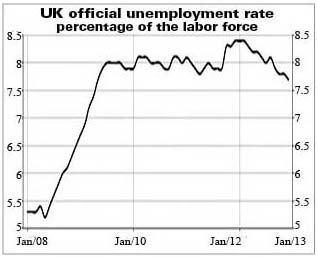

Vol. 77/No. 5 February 11, 2013

|
“The UK is stuck in a rut” reported the Jan. 26 Wall Street Journal. “The economy has contracted in four of the last five quarters” and output “is still 3.2% below its prerecession peak.”
According to a Dec. 7 Financial Times article, manufacturing output in October was 2.1 percent lower than the previous year. The paper also pointed out that “the trade deficit had widened from £2.5bn [$3.95 billion] the previous month to £3.6bn [$5.7 billion] in October, damping hopes that a rise in exports could boost the UK economy.”
At the same time, the big-business press has lauded a Jan. 23 report by the Office for National Statistics that the number of unemployed had fallen by 37,000 between September and November, bringing the jobless rate down to 7.7 percent from 7.8 percent the previous quarter. This most recent figure registers a 10-month decline in the official rate.
According to the ONS, 2.49 million people were jobless in November, a figure roughly similar to the period between mid-2009 and early 2010, before it spiked up and then declined for 10 months. But this means the number of officially jobless remains more than 800,000 higher than it was in May 2008, before its one-year steep rise.
While official figures point to a downward trend in joblessness over the last 10 months to November, they are calculated to mask the real scope of the employment crisis workers face. The government stats, for example, disregard the rising number of those classified as underemployed, which has increased by 50 percent since 2008. More than 3 million workers—10 percent of the workforce—are in this category. The majority of them want to work full time, but work 30 hours or less. Many of these workers are employed on a temporary basis by agencies.
While many papers extol the jobless figures as evidence of an improving economic situation, commentators in the economic press reflect bosses’ concerns that a little job recovery under current circumstances is bad for their profits. (The fact that higher unemployment provides better conditions to drive on workers’ wages and working conditions is left unspoken.)
“Despite this good news there is a big problem,” writes Stephen King, HSBC chief economist in the Times, published in London. “A rapid increase in jobs combined with no increase in output means a decline in productivity. It suggests a significant and sustained loss of competitiveness.”
The most recent government report also shows a decline in real wages, which nominally rose by an average of 1.5 percent over one year, while official inflation rose 2.7 percent. Meanwhile, government officials have been moving to cut back the welfare benefit system. On Jan. 8 the government announced a 1 percent cap on annual increases in working-age benefits and tax credits. Primarily targeting unemployment payments, it also affects other benefits, including maternity allowances, sick pay and child tax credits.
This assault has gone hand-in-hand with efforts to scapegoat unemployed workers, aimed at eroding solidarity and garnering support for the cuts.
“It’s unfair that when that person leaves their home early in the morning, they pull the door behind them, they’re going off to do their job, they’re looking at their next-door neighbor, the blinds are down, and that family is living a life on benefits,” Chancellor of the Exchequer George Osborne said at a Conservative Party conference in October.
Osborne pledged Jan. 25 to continue a course of government budget cuts, despite pressure to slow the pace of “austerity” and its potentially economic contracting consequences in face of falling gross domestic product.
While criticizing the government for “cutting too far and too fast,” Edward Balls, Labour’s shadow chancellor, said in a September interview with the Daily Telegraph that if his party wins the next election it would be “ruthless and disciplined” in implementing government spending cuts.
Related articles:
‘We are not giving back what we won in struggle’
NYC school bus workers fight union busting
Bangladesh: Workers protest deaths in Jan. 27 fire
Sanitation workers in Ga. march for union
Greek gov’t orders workers to end subway strike under threat of jail
Front page (for this issue) |
Home |
Text-version home